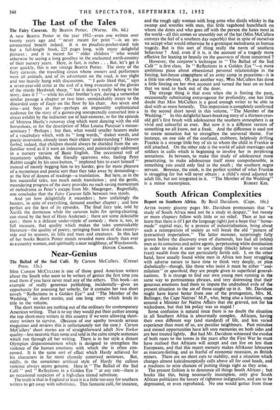The Last of the Tales
The Fairy Caravan. By Beatrix Potter. (Warne. 10s. 6d.) A NEW Beatrix Potter in the year 1052—even one written over twenty years ago and " never meant for print "—is an un- covenanted benefit indeed. It is no pinafore-pocket-sized tale but a full-length book, 225 pages long, with many delightful pictures ; and it is meant for " older children " who would otherwise be saying a long goodbye to the enchanted north-country of their nursery years. Here, in fact, is riches . . . But, let's get it over quickly, this is not vintage Beatrix Potter. The story of the fairy caravan, the travelling circus whose owners and performers were all animals, and of its adventures on the road, is too slight and too heavily hung with discussions. " I quite liked that," says a seven-year-old critic at the end of a long evocation of the glories of the sturdy Herdwick sheep, " but it doesn't really belong to the story, does it ? "— while his elder brother's eye, during a somewhat similar passage a chapter or two later, unmistakably strays to the discarded copy of Eagle on the floor by his chair. Are seven and nine—and • boys at that—perhaps an impossibly sophisticated audience for the story of a guinea-pig unexpectedly converted into a circus exhibit by the indiscreet use of hair-restorer, or for the episode of Mistress cleelis's runaway clog which went dancing with the old horseshoes, or for the description of Miss Louisa Pussycat's mouse- seminary ? • Perhaps ; but then, what would smaller hearers make of a vocabulary which, with its " long words," dialect words, and poetic inversions, already taxes their elders' understanding ? Heaven forbid, indeed, that children should always be shielded from the un- familiar word as if it were an indecency, and painstakingly addressed in a nursery version of Basic English. The occasional roll of incantatory syllables, the friendly sparrows who, finding Peter Rabbit caught by his coat-button, " implored him to exert himself " instead of merely begging him to try harder, give far more pleasure of a mysterious and poetic sort than they take away by demanding— at the first of dozens of readings—a translation. But here, as in the less successful tales, too much needs translation ; and the gentle, meandering progress of the story provides no such saving momentum of melodrama as Peter's escape from Mr. Macgregor. Regretfully, one concludes that the Fairy Caravan falls between two stools. And yet how delightfully it meanders ; how unfailingly the hearers, in spite of everything, demand another chapter ; and how perfect are the best of its episodes. The final fairy tale, told by Xarifa the dormouse while the caravan halts for spring-cleaning, can stand by the best of Hans Andersen ; there are some delectable cats ; there is a delicate under-ripple of comedy ; there is, too, in full measure, that quality which makes the tales unmistakably literature—the quality of poetry, springing from love of the country- side and its seasons, its hills and trees and creatures. In this last of her books Beatrix Potter stands revealed more clearly than ever as a country woman, and spiritually a near neighbour, of Wordsworth.
HONOR CROOME.


































 Previous page
Previous page